#{What her heart desires}
Text
Lae'zel is like a play on the "I'm not other girls" thing, except she's trying SO hard to be like other Gith girls. She's trying to steel her heart and be a perfect soldier in the collective army serving beneath Vlaakith. No will of her own. Just blind servitude alongside the other Gith who are also denying their own individualism.
Rather than gutting the companions right then and there - as any other Githyanki would do - she joins them AND promises them a cure. A cure that was meant to be ONLY for Githyanki warriors. And she doesn't know about the lies or the fact that he cure is a death sentence, but she still extends that olive branch to the group. She'll speak up when she's grouchy and try to project a hard exterior, but she's SO secretly soft.
When you approach Rosymorn, she'll stay on that part of the map if you try to leave. Upon returning, you can make her admit she missed you.
You can make the strong Gith who was raised to pillage, kill, and conquer admit that she missed the player character.
Lae'zel isn't like other Gith Girls.
Her act two scene is trying to progress the romance as though it were between two Gith raised within that culture. It's a fight to prove your worth through your battle prowess, which makes only the best *warriors* worthy of companionship. However, it becomes clear that isn't want Lae'zel wants. If the player loses, and Bae'zel beats the fuck out of them, she becomes distraught because she doesn't WANT to fight her romantic partner.
She wants to mutually protect one another. She wants companionship with her partner. She wants to enjoy the sunrise with them, feel the tickle of the night breeze, see the Tears of Selune chase after the moon across the night sky, she wants to live and she wants to share those experiences with her love. She doesn't WANT to be the stone cold Gith that she was raised to be.
Lae'zel wasn't given any role to do with the eggs, but once the egg is in the party's possession, she's instantly drawn to it. When Xan hatches, she gives him a name to represent that he'll be raised to be free to be himself. He'll have the freedom to choose his own path, whatever that maybe. Xan DOESN'T have to be like the other Gith. He could be a scholar, an artist, a warrior, anything he wishes to be. It's his life and Lae'zel is just happy to see her little Xan be raised with the freedom she didn't realize she craved until she arrived on that silly little planet.
Lae'zel isn't like other Gith girls because no two people are the same, even if raised in the same circumstances and culture. Everyone is an individual, even when they serve a collective or are fighting alongside Allies with the same main goal.
Lae'zel isn't just a nameless, faceless soldier. She isn't interchangeable with other Gith. She isn't like the other Gith girlies.
#bat rambles#i'm gonna be stewing on this for a bit#she's 22 and coming into herself and realizing she is going against the grain of her culture#her culture just is trying to remove individuality beyond like#how it may help them be a better fighter/warrior#free thinking literally gets you killed in this culture#so behaving like the other gith girls is a way to protect herself and increase survivability#and like i dont' think this is an intentional thought of hers#i think she genuinely thinks this is who she is and what she wants#but her character arc is unraveling all of that and figuring out what *her* desires are and also#her appreciating the world she had previously steeled her heart against#lae'zel
139 notes
·
View notes
Text
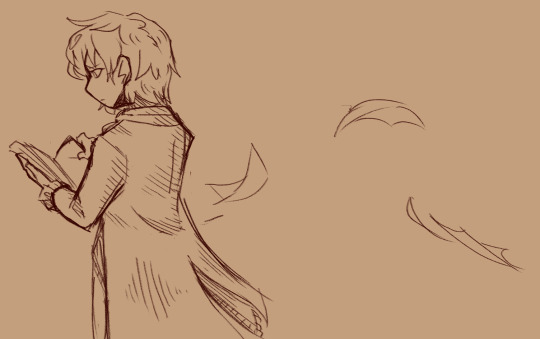
maybe we'll try again next time.
#pikart#projmoon#(LONG TAGS..) i talk a lot about that latter part of poems of a machine but the first chorus never fails to break my heart too#i can never remember what ive talked about and what i havent so ill do it again anyway.#specifically the line 'so here i lie; reading you my poetic stupid rhymes.' especially in conjunction with the very first lyric.#all this built up... mess and madness; concepts of impossible scope and importance for just a few words.#its the desire to express a truth outside of your reach. to tentatively try to identify; to speak; and only managing so much.#clumsy; basic; small; but it still holds a piece of your heart anyway. its not enough; but its real; its tangible; and thus important.#am i making sense? its the first steps into writing poetry / into self expression / into self acceptance / into healing and growing.#and the implication these words are being shared; despite all of this; despite all of Her. augh.#i really do think a lot about th stark difference btwn her Knowledge and her Experience. how she feels she Should function vs how she Does.#knowing how something should be vs how it Is. yknow.#anyway Oops ! Lyric Rambling In The Tags Again ! <33
44 notes
·
View notes
Photo


tell me you know who I am
#kingdom hearts#kh#kingdom hearts union χ#khux#xehanort#young xehanort#player kh#strelitzia#thinking so earnestly about the idea of xehanort and strelitzia meeting and being friends 🥺#like you missed it by a couple thousand years and then by like another eighty years and another reality..............but what if#strelitzia whose desire to make a friend led to her demise#xehanort whose desire to find his friends led to his descent into darkness#what if they were friends. they could be friends#my art#kh art
784 notes
·
View notes
Text
Sally's apology to John really struck me as a raw, meaningful parent-to-child apology. She didn't dumb anything down, she didn't lie to soften anything, she claimed all of her actions... he was so young, and Sally reacted to his age not by talking down to him, but by finding a way to describe the whole truth so he could understand
Most importantly I think is how she kept saying that John is a good person. Like...she thought she was about to die. And she didn't spend that time asking John for forgiveness or to remember her in a good light. She dedicated her words to making John feel loved. She spent that precious time giving him something to make sense of it all, to heal somewhere down the line even when she's not there
#HHHHHHUHHHHHHHHHH#i know that Sally & John's interactions at the college indicate a bunch of fucked-up-edness#ie him saying 'i love you' & her not hearing it. her asking him for reassurance#but i see the apology scene & her concern for him after the shooting#as evidence that she's going to give him SOMETHING good as his mother.#call me what u want but i have faith in them.#She's not perfect and they've got SOOOO much shit to live with. the both of them.#but amongst all of her motivations there is a genuine desire to see her son safe & happy#and i'm crossing my heart & hoping to die that -- now that Barry's not there -- that love for John comes through. and that he feels it.#the fact that they had an easy conversation outsite the theater; there was no indication Sally is using substances; John is sober;#and that John has friends.... I'm choosing to take these as indicators that -- despite the genuine problems that Are there --#John & Sally are reasonably healthy and so is their relationship.#oh god. this show. takes a fucking Lot out of me#barry hbo#sally reed#john berkman#barry finale#barry meta#pyra speaks
99 notes
·
View notes
Photo
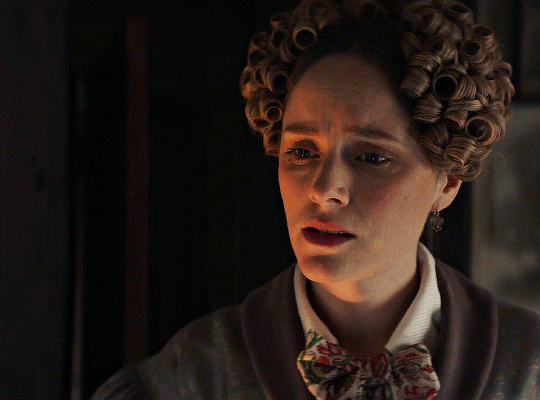
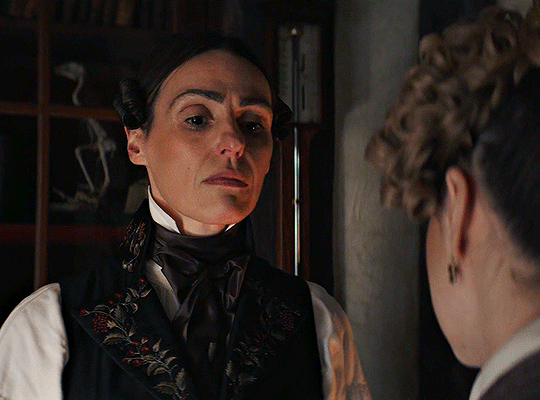
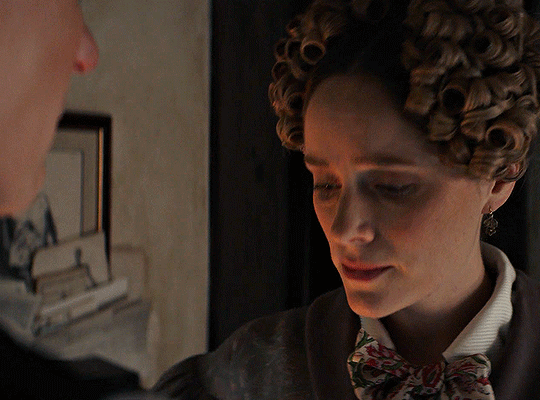
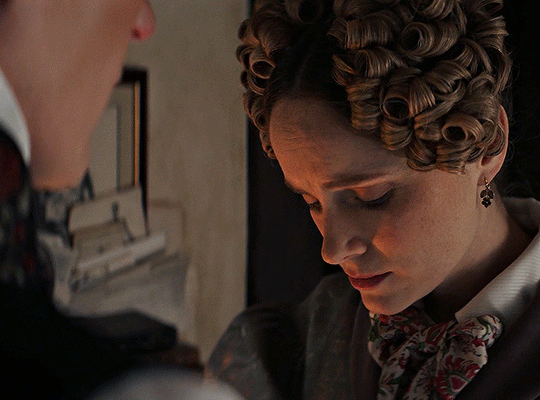
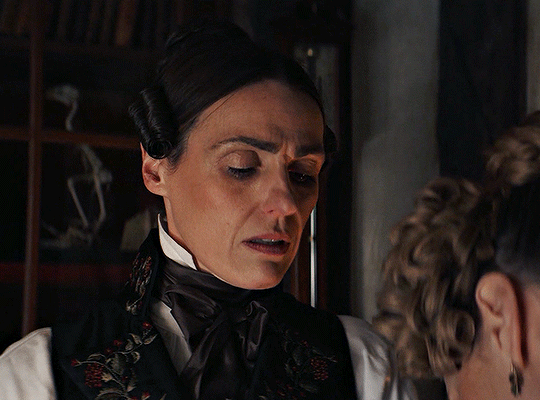
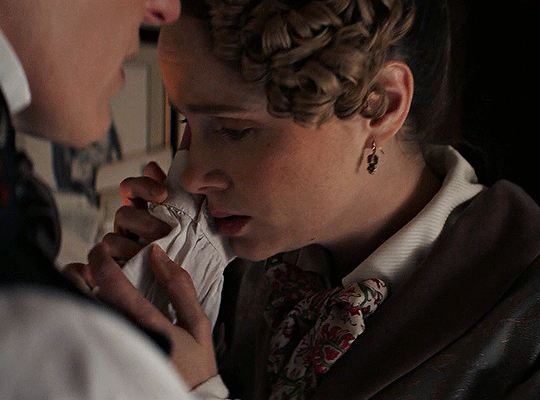
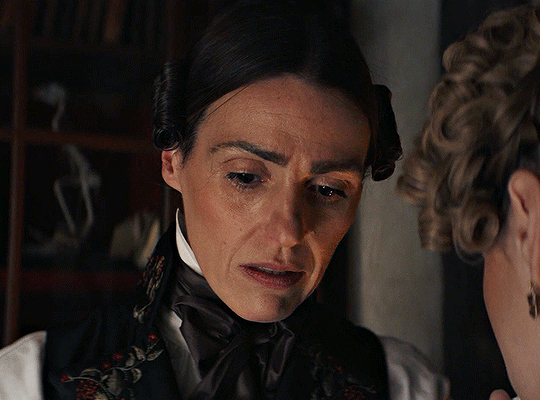
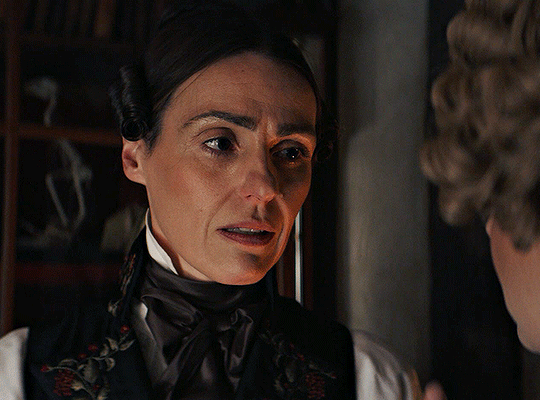
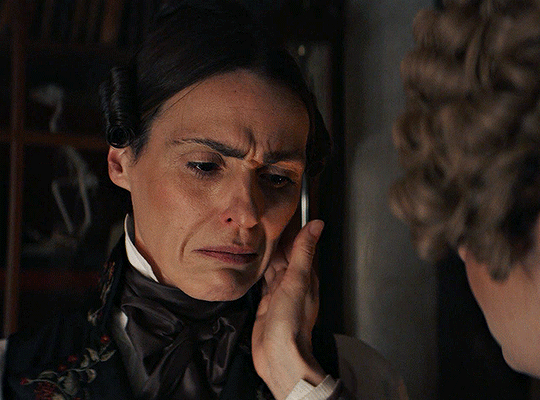
She always surprises me.
#gentleman jack#perioddramaedit#gentlemanjackedit#gentlemanjackdaily#gentleman jack spoilers#anne lister#ann walker#suranne jones#sophie rundle#gifs#iredreamer#best scene of the whole season for now but now i need to rant because i can't with anne being so terrified it breaks my heart#and her fears are just so fucking real the fact that ann could want something that she could never EVER give he breaks her#just think how she tries to always give ann what she needs and desires all the time but children you know? if ann wants children then what??#and she's terrified because she can't do anything about it#and this whole ending#MY GOD ANN WALKER OWNS MY ASS YALL#the way adney takes her hand#THE KISS#THE CARESS#good lord help#i've said this in season one and i'll say it again#the way ann walker comforts anne lister mirroring the ways in which anne lister takes care of her fucking sends me#i need to write a proper analysis of this scene#bye
869 notes
·
View notes
Text
did. did alyss think that red eyes would be perfect for cheshire because. those with red eyes are the only ones besides glen who can approach the core. and alyss is kind of half merged with/the spokesperson for the core. and cheshire is very dear to her. just like lacie was to the core---
#pandora hearts spoilers#tre reads#pandora hearts#intention of the abyss#alyss#cheshire cat#core of the abyss#lacie baskerville#just fic thoughts#h e l p#like obviously they don't like ALL children of ill omen#(see: her seething hatred of vincent and her general disregard for break's desire to keep his eyes)#but most of the people she sees are probably the illegal contractors who are gonna be doomed no matter what#maybe the core's influence makes her associate red eyes with happiness or something... man idk lol#maybe that doesn't really make any sense idk#but. maybe. -w- it's certainly fun to think about the possibilities anyways.
10 notes
·
View notes
Text

i don't want to argue with this person and I don't even necessarily disagree with the main point of "dungeon meshi is driven by familial connections, not romantic ones" but in trying to argue this he like, widely downplays how important falin is to marcille, so much so that it kind of ends up undercutting his point
like yeah, dungeon meshi is driven by familial relationships more than anything else, but do you know what the most important and plot-driving relationship is in the manga, that isn't a familial one? It's Marcille and Falin, by far.
I do kind of suspect that what tagasaing is identifying as "useless ship wars" is just like, people downplaying or ignoring the Falin and Marcille connection (whether or not you even interpret this as romantic or whatever), and other people getting understandably annoyed at this.
#dungeon meshi#rant over lmao#sorry that post just pissed me off.#so much of it is just the op focussing on how much laois loves his sister while ignoring examples of Marcille loving her similarly lmao#it's just so weird to read this manga where this woman's desire to save another woman is one of the main driving forces of the story#and then looking through the tumblr tag or at the subreddit and there are people focussing on her relationship with laois?#(a person she is mainly disgusted and annoyed by? who she's only still travelling with to rescue his sister?)#or shipping her with CHILCHUCK???#when she never really like#shows any behaviour that could be construed as attraction towards either of them?#(or only stuff that's miniscule compared to compared to how she views and treats falin in the text?)#and simultaneously these people are ignoring and downplaying the falin connection#like yeah people are going to get annoyed about that. or talk about how weird that is#and that's.... not a 'ship war'#like maybe it's annoying to people but that is not the heart of what is going on there lmao
7 notes
·
View notes
Text
Side Order is fucking amazing. However, I cannot lie I could not stop going "XENOBLADE 3?!" at every plot/lore reveal in it
Of course, it's only surface level similarities and upon looking deeper at the lore there are significant differences. But it is still funny how similar the basic premise is.
#Side Order spoilers in the tags. Be warned and be aware#When Order first came up and explained what it is I yelled “MOEBIUS??!!!”#and then Marina explained the Memverse#She created splatoon's own Origin and Aionios#and then Palettes and how they're the soul of a character manifested as a weapon.#they turned Xenoblade 3 into octopus rougelike#and it is fantastic#even Order/Smollusk's goal of creating a changeless world where the inhabitants have no real free will of their own?#based on the collective desire for stability and fear of an unstable and unknown future held by each and everyone?#that is literally Moebius and Aionios#The collective fear of change and desire for stability manifesting and creating a world where nothing changes#After hijacking a supercomputer#again only surface-level similarities#cause Aionios isn't completely digital like the Memverse is. Aionios is the real worlds of Alrest and Bionis/Mechonis fused together#via Origin.#Further more#Origin was created out of necessity to save the two universes of the Xenoblade series.#Marina created the Memverse not out of necessity but rather the good of her heart#and then the Memverse needs to be freed from Order's control only to free the wills of the people#while Aionios is actually dying and everything will cease to exist if Moebius isn't stopped and free will restored#because whether they like it or not change will happen. and refusal to accept that can be detrimental.#Both Xenoblade 3 and Side Order both share a theme of accepting change despite how frightening it can be#it's interesting to see how they portray and commentate on that in similar yet different ways#it's the Xenoblade 3 brainrot. it's what's causing me to notice this#xenoblade chronicles#xenoblade chronicles 3#xenoblade#xenoblade 3#splatoon 3 side order#splatoon 3 side order spoilers
11 notes
·
View notes
Text

@warabola they don't interact much in my headcanon because Virginia is busy plotting and scheming, and the Deviless has places to go and souls to abstract, but I think they meet for tea sometimes to gossip about Hiram's latest misadventures. Virginia complains about the railway taking too long to be completed because Hiram choose to go get killed somewhere instead of calling a board meeting, and the Deviless nods and agrees sipping her tea like don't worry girl he's gonna respawn in a sec. Virginia is only worried about the railway of course. The Deviless nods and agrees, of course.
#I think the deviless would just tease virginia and hint at her feelimgs for hiram#(feelings that absolutely don't exist because it's more funny to headcanon them as rivals)#but the deviless would just be like yeah yeah we all know what rivalry implies ;)#and virginia would probably make the politest :) face imaginable#and put “kill hiram before the fingerkings get to him next time” on her agenda#I played motr with the same character for backstory reasons and now all the interactions with virginia after that#AND after hearts desire are so funny to imagine sjdjfkfl#hiram x virginia#<- there's only crack content in this this tag btw
17 notes
·
View notes
Text
Every time I read Komarr / ACC I flip-flop between “Ekaterin, bestie, you can do better” and “You can’t help but love the little monster, though,” and every time it cracks me up that all of Miles’s nearest and dearest tell her the exact same thing.
Like, I wouldn’t want to marry the man, but I do get it.
#vorkosigan saga#ultimately he *does* just want her to be happy#miles always wants to give everyone their heart’s desire#i think - in part - because his was so often being held just out of reach by the world around him#he just has this nasty little habit of then trying to decide for them what that should look like
44 notes
·
View notes
Note
So sorry if this is bothering you but so curious as well... why do you hate Guts?
Thanks for your time ❤
you’re not bothering me!
I think the simplest way to answer this is with one of Olivia’s own lyrics from pretty isn’t pretty when she sings “none of it matters and none of it ends” because. That is kind of her whole ethos about how life works. She believes that! And so her work, to me, is profoundly cynical and self-absorbed because it can’t point to anything bigger (none of it matters) so it revolves purely around her own feelings. It won’t ever situate itself in a wider picture. And I love whining in a song tbh. I love when an artist captures those uglier emotions —the discontent, the restlessness, the irritation, the blandness and staleness of it all and the railing against it—because those are all part of the human experience. I am continually shocked—it is shoCKING—by how many negative emotions I can and do experience over and over again. But it is thankfully against the backdrop of reality. My bad moods are something that can be so unpleasant to feel and so ugly to witness—I wrestle with how ugly and small my suffering is—but there is a way in which, all discourse about the validity of any and all of my feelings accounted for, those aren’t real. Just symptoms of my suffering and sometimes my convalescence (lol, love a symptom of convalescence) but reality is still always so much realer. It’s always ready to break in a million times a day; the beauty and sturdiness of reality, the texture of existence, as Flannery O’Connor once said, is always there and with enough time (and with patience and help and love) I can get back to contact with it. Not just the state of my own mind full of bitterness and worry and pain, endlessly stewing in its own unhappiness.
I am not good at that, it takes a lot to get me there. But I guess my point is—to circle back—Olivia’s music doesn’t try and doesn’t want to. Its scope is so narrow, every song no matter how pleasing at first eventually sours (lololololol) because it’s JUST rooted in her own experience, generally her own suffering. And there’s no sharpness or cleverness in the world (she can be both sharp and clever!) that can hide that lack of range. So you hear a song once—for me, it was brutal—-and you’re like YEAH. I recognize this kind of whininess because I’ve felt it before. There is something true to it! But the more she writes the more you watch her do it over and over again (sonically, too, she loves to speak-talk and tbh they’re just sub-par remixes of brutal) the more you start to be like “oh, is that it? We’re not going anywhere with this? There’s no turn or catharsis or bridge or anything that lifts us out of this even for a second?” and it’s just —blegh.
And the thing is there doesn’t even have to be, like, some triumphant girlboss victory where she feels better. I’m not saying her songs are bad because they’re sad and depressing. It’s that they establish no outside contact with reality. They are, for all her clever little film-noir references or whatever, only ever self-referential. And that gets old so fast no matter who is talking.
#yes of course I contrast her with Taylor#Taylor can be beautifully petty and restless and sad and insecure and her songs are never just about her#They are always situated in a broader picture of reality. They go down to the roots of things. Of humanity and love and the human condition#and it’s just. It’s so much bigger. It is not stifling#and that’s the staying power and that’s the inherent hopefulness she has and that’s her desire to know the truth and speak the truth#Even when she’s getting it wrong it’s all still there#anyway it’s funny because Taylor gets accused of what Olivia actually is doing so much more than Olivia#people love to pretend that Taylor is a wallower and self-indulgent#and yes there’s a very human humanity to the expression of her emotions. There IS brattiness there is anger#but the core is so good that those things become what they are —only the endearing and funny trappings of her expression#never the heart#it’s why Taylor wears so well and also why sometimes she is jarring on first listen. You can just hear the dissonance (for me too)#But it’s like that one tweet said. Doesn’t matter if you like a taylor song on first listen. You WILL eventually#and it’s so true. And that’s the quality drawing you in#Olivia (and much of gen z tbh) is kind of the opposite: the humanity is in the trappings#She’s fairly easy to listen to and like ….. at first#the humanity and cleverness and beauty such as they are are on the surface#there’s a deceptive ease and an openness that doesn’t actually lead you anywhere#It leaves you empty because it’s just all kind of built on the fumes of a bad mood tbh#turning off reblogs lol#Anyway thank you for asking and giving me this opportunity to speak#all opinions are mine and that’s what they are. If anyone feels differently more power to you. Go forth and enjoy guts#Just putting all my caveats here
16 notes
·
View notes
Text
'Beyond This Power of My Nature': Hera’s self-perception and relationship to humanity
Okay, this is something I’ve wanted to make a proper post about for a long time now: what evidence we have for how Hera sees herself in canon, why I think it’s important to acknowledge she is written with an element of physicality, and how I think, keeping the themes of Wolf 359 in mind, Hera as an AI Character comes across very differently from a lot of other AI Characters. The idea that she is fundamentally human has different implications in the context of a show that is so focused on humanity, and specifically on the way that its characters (at various points) navigate, reject, desperately try to hold onto, and are repeatedly denied recognition of their humanity. There’s so much more I could say on the topic, but. This post is already over six thousand words, so it will have to do.
tl;dr: Hera’s identity is not representative of AI Identity in any broader sense, even just within Wolf 359. Hera has a defined internal self image that is singular, and distinct from the Hephaestus or any systems she runs. There is an aspect of physicality to the way she is written, performed, and treated by the text, and she canonically experiences physical loneliness. Her feelings of isolation and the ways she is othered, even by herself at times, are reflective of very real human experiences - in particular, I have to touch on how I feel Hera can be read as a trans character. Hera struggles with the feeling that she is inherently different from everyone around her, and therefore intrinsically doomed, and it is only by letting go of those fatalistic notions, realizing she and her friends are more alike than different, that she can start to move forward and imagine a life for herself.
A couple of disclaimers:
For the purposes of this post, assume that ‘personhood’ (recognition as a full and equal person to any other person) and ‘humanity’ (the quality of Being Human, however nebulously defined) are separate, albeit related, concepts. Assume that ‘personhood’ is a given for all sentient beings as far as the text is concerned, even if other characters within the text may not extend the same courtesy.
I’d also like to say that I know the subject of Humanity as it relates to AI characters can be a touchy one - I’m also coming at this from the perspective of someone who finds it a little distasteful to ascribe a Human Identity to characters who already have their own, complete, distinctly non-human identities, or to place Humanity on a pedestal in a sci-fi context where humans are the peers of other sentient beings. I don’t think these concerns apply to Hera, or to Wolf 359 as a show, but just to be clear: everything I want to say here is about Hera, specifically. It’s not meant to apply to other AI characters, even within Wolf 359, and it definitely isn’t meant to be viewed through the lens of real-world AI development. I believe Wolf 359 is a character drama above anything else, and I believe it is especially concerned with its exploration of humanity - something I’ll talk more about later. With that said:
i. ‘some do. i don’t.’: other examples of AI identity in wolf 359
How much do we know about general concepts of AI identity in the universe of Wolf 359? The short answer… not much. The slightly longer answer:
When Minkowski introduces herself to Hera, there’s this exchange:
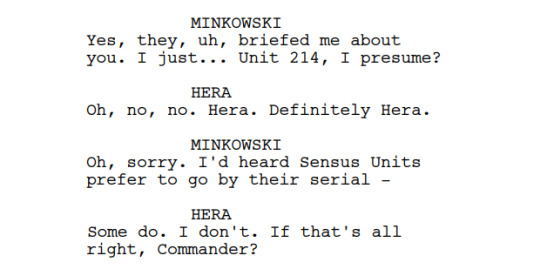
(Ep. 61: MINKOWSKI: Yes, they, uh, briefed me about you. I just... Unit 214, I presume? / HERA: Oh, no, no. Hera. Definitely Hera. / MINKOWSKI: Oh, sorry. I'd heard Sensus Units prefer to go by their serial - / HERA: Some do. I don't. If that's all right, Commander?)
Minkowski says she “heard Sensus Units prefer to go by their serial [numbers]” and Hera responds, “Some do. I don’t.” … It’s entirely possible that both Minkowski and Hera are going off of Goddard propaganda here, or that Hera doesn’t know what other Sensus Units might think at all and she’s just trying to defer to Minkowski before making a request of her. But for all we know, maybe that’s true? Maybe some Sensus Units really do prefer that. And whether it’s true or not doesn’t really matter. In saying it, Hera acknowledges that all AIs may not feel the way she does, but that this is how she feels about her name.
In Change of Mind, we have this exchange between Eris and Lovelace:

(Suddenly, behind her, there's a soft WOOSH! Lovelace spins around and - finds herself face-to-face with a YOUNG WOMAN. / ERIS: Hi. / Lovelace blinks. Confused. / LOVELACE: Hi? What - who - / ERIS: It's me. Eris. / LOVELACE: But... I thought you were an A.I. / ERIS: I am. This is how I see myself. Well, how I see a version of myself. As long as we're both in a mental state, we can interact this way. Remember, you're not really here either. / LOVELACE: But... look at you. You're - / ERIS: Yeah. I know.)
I’m not going to speculate on exactly how Eris appears in this scene, but: “This is how I see myself. Well, how I see a version of myself.” is interesting to consider, both in the context that Eris has an internal sense of self (presumably human in appearance, as far as the stage notes go) and the suggestion that there are other ways she sees herself that might be equally ‘her’ - does this mean Eris as in the Eris we know in Change of Mind, or does it imply that each iteration of Eris, in each of the training modules Goddard uses her consciousness for, perceives herself differently? Both? Neither?
And I think it’s revealing to show these two lines next to each other:

(LAMBERT: Rhea says... “It’s just the way they programmed her, back off.”)

(Ep. 7: EIFFEL: C’mon, Commander, you can’t really hold that against her. It’s just her programming! / HERA: Oh, stop. Do you have any idea how condescending that is? Just chalking everything I do to my programming? What if I just went around blaming every stupid decision you made on... “biology”? / EIFFEL: Hera... / HERA: “Why are they doing that, isn’t that a bit dangerous?” Oh never mind, that’s just their biology. “That’s a terrible idea, don’t they know any better?” Just that pesky ol’ biology, we really should’ve sprang for the more expensive model.)
… Which. I kinda think the difference in philosophy there speaks for itself. Sure, Rhea’s line is in defense of Eris, while Hera doesn’t appreciate ‘it’s just programming’ being used as a defense of herself, but I find it hard to imagine she’d ever see it as anything but condescension.
It also might be worth noting that none of the other AIs we know (despite how little we know about them) seem to be people Hera would really get along with: Enlil is the exact “willing to roll over for any bozo in a lab coat” type of AI who gets the “cushy job flying jet liners over the Atlantic” she shows such disdain for; if Hera met Eris it would likely be under circumstances where Eris was a threat to her friends + despite Eris’s ‘rogue AI’ aesthetic, she is designed to serve that purpose by Goddard and serves her role (and accepts her fate) without much resistance; and we don’t know much about Rhea, but from her defense of Eris, and what we can interpret from her limited interactions as a sense of professionalism, she and Hera also… likely would not see eye to eye.
All of that to say: we don’t know much about AI identity as it broadly exists within the setting of Wolf 359, but I think we do know enough to fairly assume it’s as varied and individual as identity would be for any other group of people. Which… of course it would be. I think it’s entirely possible that some AIs would have a sense of self-identity that is entirely divorced from human categorization. And all of this presents a ton of questions that I don’t really have answers for, that I don’t think we even have enough information about in canon to properly speculate on, but I think it’s important groundwork to lay out to further emphasize: when I talk about Hera’s identity, I am talking about Hera’s identity. How she sees herself, how she wants to be seen, what she values, etc. as an individual person. So.
ii. ‘you’re remembering this wrong’: what the subjective reality of memory can tell us about hera’s self-perception
If there was only one scene I could call attention to here, one piece of evidence re: Hera’s identity and self-perception, it would be the opening scene from Memoria. If you want to, please just go listen to that scene again, right now. Notice how it’s framed, and what the audio cues might suggest in a visual medium - in her memory, Hera perceives herself at the table with the rest of the crew. Physically present.
So much of Memoria is about subjective reality, memory as the product of the world through your own personal filter, your perspective and biases. “Everything before memory is about the world around you. Everything after it is all in your head.”
So looking at how Hera remembers things, more than anything else, I think can tell us a lot about how she perceives herself. Even when she doesn’t realize it. ‘Minkowski’ in Hera’s memory says… well. We get this scene:
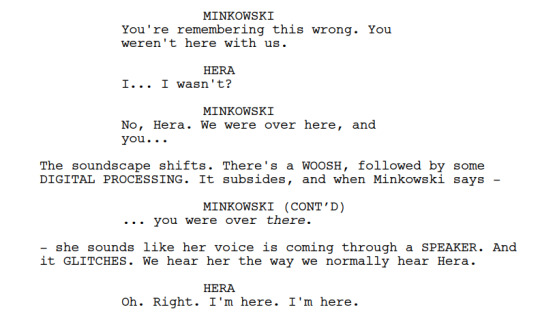
(Ep. 41: MINKOWSKI: You're remembering this wrong. You weren't here with us. / HERA: I... I wasn't? / MINKOWSKI: No, Hera. We were over here, and you... / The soundscape shifts. There's a WOOSH, followed by some DIGITAL PROCESSING. It subsides, and when Minkowski says - / MINKOWSKI (CONT’D): ... you were over there. / - she sounds like her voice is coming through a SPEAKER. And it GLITCHES. We hear her the way we normally hear Hera. / HERA: Oh. Right. I'm here. I'm here.)
But here’s the thing. Minkowski - the real Minkowski - would never say Hera wasn’t there with them, because from Minkowski’s perspective, she was. This is Hera’s perspective - Hera feels as if she wasn’t there. And to quote @the-empty-man, from a similar conversation we had a while back: ‘in the actual reality of that Thanksgiving meal, she was there with them in the sense that she could directly see them and hear them and interact with them in various ways and (if we think of her as being located in the Hephaestus) she was kind of sharing the same physical space as them. In the reality of that memory, she was as "there with them" as she ever has been with anyone (excluding weird mind-space things) but that didn't feel like enough for her. If she doesn't think she was fully there with them then (or at least a part of her doesn't), then she's never felt like she's been fully there with anyone (again maybe excluding mind-space weirdness). It's like she's got this longing for something that she barely even has a frame of reference for.’
I think that’s just it. Hera experiences physical loneliness. The wording of “over there.” The shift in sound design, and the implication that Hera hears the others the way they hear her - that she’s not an equal presence in a different form, from her own perspective, but physically somewhere else on the other side of an impassable barrier that the others don’t even recognize exists. She has an image of herself in her mind that most other people never see.
Still, ‘how does Hera see herself?’ is a difficult question, and not one I’m going to be able to answer all at once. For now, it might be useful to first point out how Hera definitely, canonically does NOT see herself - she does not see herself as the Hephaestus.
In her own memory, she imagines herself as singular, physical, (by all indication) human in appearance. Without the awareness that ‘mind-space weirdness’ is even possible, that appearance is for no one but herself. And the Hephaestus, I think, is an entity in its own right, and one that Hera is bound to for most of the show, but she exists within it, not as an inherent part of it. Her connection to the Hephaestus, the functions she performs, are her job. The further into the show you get, and the more Hera asserts her own autonomy, the more the text distinguishes between Hera, the systems that she runs, and even her hardware. And, of course: “Or end up in other places. Doing things not because you're good at them, but just because of what you are. Has it ever occurred to you that there might be jobs for which the only requirement is having no pulse?”
iii. ‘i know what’s waiting for me back there’: when and why hera rejects humanity
It’s important to note that Hera’s identity absolutely is informed by the fact that she’s an AI, and the way she navigates the world and her relationships because of it. At times, this creates something of a double bind for her - it’s frustrating to have others acknowledge her situation, when it others her and creates or emphasizes a reminder of the distance between them, but it’s also frustrating when they don’t recognize she can’t always do the things that they can do, or that she has other physical/safety/etc. concerns that wouldn’t occur to them.
Consider the part in Theta Scenario where Eiffel has them vote on whether or not to return to Earth and sheepishly has to add, “and, uh… all those without hands?” The progression of this scene is a good illustration re: Hera’s alternating refusal of and embrace of humanity: she blames her loneliness on her programming, her attachments, her humanity - she chooses to separate herself from these things without ever making an affirmative statement as to what part of her would be Her in their place. That’s because it’s coming from a place of hurt. And remember that she’s still dealing with Maxwell’s betrayal. This is an emotional reaction, which I suppose is worth noting in itself: when Hera is hurt, her judgment is clouded, and she can be confidently wrong. Consider how convinced she was that Hilbert was making everything about Decima up, while she was at the height of her anger with him.
When Hera is hurt, when she is feeling betrayed, and frightened, she tends to self-isolate - she leans into the idea that she is fundamentally different and therefore intrinsically doomed. It’s only by letting go of these preconceptions and allowing for real connection that she’s able to heal. It’s true that the only people who have hurt her have been humans - but so are the only people who have ever helped her, who she’s had any meaningful relationships with at all. She has to believe she isn’t fundamentally different from the others, because ultimately that’s what allows her to return home with them - to think maybe there could be something for her on Earth after all. And by choosing to believe in Eiffel’s promise to her, that whatever happens when they get back to Earth, they’ll go through it together… That's a start.
iv. ‘i know where this train goes, i've been on it before. "she'll hurt someone. she can't be trusted. it's okay - she isn't even human.’: hera, lovelace, and real-world alienation
I think it’s also worth noting, however, that while Hera’s identity is informed by being an AI, the implication of Being an AI in the world of Wolf 359 specifically manifests in ways that are directly applicable to real-world human experiences. The double bind that I described, the lack of life experience compared to your peers and the embarrassment associated with that, the feeling of alienation and isolation, even the feeling of being ‘not quite human’ through repeated dehumanization and othering - these are things that real people experience. In the same way that Lovelace is an alien clone, yes, but more importantly just a person with PTSD… Hera is an AI, but she’s also a person with anxiety and chronic pain - and with experiences that I think can be directly drawn to neurodivergent, disabled, and trans experiences in various ways. I’ll try not to get too into that aspect of it here, but I do think it’s worth noting - Wolf 359 is a show about humanity, about people whose humanity has been denied to them in various ways, interpersonally and/or systemically, and I think it’s important to consider Hera’s character arc and the ways she chooses to assert her autonomy and self-identity within that framework.
And of course, speaking of Lovelace, it’s impossible to ignore that Hera is the most staunch and immediate defender of Lovelace’s humanity, following the realization that Lovelace is herself an alien clone, because Hera recognizes the way others react to her perceived differences with fear, distrust, etc. and how they will use those feelings to justify dehumanizing her. Lovelace’s humanity and Hera’s humanity are directly linked in the text.
v. ‘it’s like you’re making a movie’: why i think it does hera’s character arc a disservice to approach it with general biases regarding AI characters
You know that thing about how Wolf 359 leans into sci-fi tropes? How Eiffel is the wisecracking everyman, Minkowski is the by-the-books Commander, Hilbert is… well, you know. And so on. But instead of being subversions of these common archetypes, the characters in Wolf 359 are as intricate and contradictory and dynamic as they are because a central tenet of the show’s character writing is to ask ‘why would a real person behave this way?’
If we extend that logic to Hera and interpret her as an example of the ‘AI who is more human than some humans’ archetype, then the answer to the question is simply… because she is fundamentally human. The failure of that trope, in my opinion, is that it often sets up an AI character in the position of ‘becoming’ human, suggesting humanity is something greater and aspirational, and often directly equating ‘being a person’ with ‘being human’, even in settings where other non-human and equally sentient forms of intelligence exist. There’s something self-aggrandizing and patronizing in that.
But this is NOT the case with Hera; she is just as human at the start of the show as she is by the end of it - her struggle is not in ‘attaining humanity’ but in navigating the biases of others, the way repeated dehumanization has affected her own self-perception - to get others to see her the way she sees herself.
vi. ‘such a big, big universe...’: isolation, the ‘big picture’, and what the contradictions in am i alone now? tell us about hera’s priorities
Here’s a line I think about a lot. Specifically, I think about how often this line is used to represent Hera… “Such a big, big universe, and you only gave yourselves the tools to think about a tiny portion of it.” It’s fascinatingly ironic when you put it back into context: consider the way this monologue is framed. She’s telling all of it to Eiffel, but she isn’t, really. That’s the conflict. She wants to be able to tell him these things in the same way she wants to be able to describe what she sees to him, to get him to understand her experience, because she can think about so many more parts of that big, big universe at once, and what does it get her? She can’t do anything with it. She can’t tell anyone. She ‘tells’ Eiffel anyway - she chooses to talk to him, even when she isn’t actually talking to him. She can’t make that connection, but she wants to, so badly.
She thinks she’ll be left alone up there, sooner or later. It’s a feeling she learns to let go of, little by little, until something else finally seems possible.
There’s a theme throughout Wolf 359: the ‘Big Picture’ as an antagonistic force, whether it’s alien and unknowable, or corporate and uncaring, or some combination, and how its counterpart is Personal Connection. That’s something I’d like to get into in more depth in another post, but it’s worth touching on here because I think keeping that in mind reframes so much of Hera’s monologue in Am I Alone Now?
Think about how much of it is those Big Ideas in contrast with the familiar and immediate - that she wants to tell these things to Eiffel. “Some days I wonder if I’ll miss you, after you go away forever… I doubt it. But you never know.” The subtext is in the contradiction. The lonelier Hera is, the more she denies her humanity, but in her denial, in her loneliness, that humanity becomes all the more apparent.
Sometimes I see people take ‘I doubt it’ at face value, as evidence of eventual character/relationship growth, suggesting she gets more attached to him over time… I don’t think that’s true. She watches a star die 13.7 light years to the left and she thinks of him. She watches the swirling, raging solar winds in colors she has no name for, and wishes she could share that with him. She’s not talking to anyone, but she still chooses to talk to him. Of course she would miss him. Of course she would.
vii. ‘even hilbert never sunk that low’: how hera is treated by the show’s antagonists
It might be interesting to note that almost all of the antagonists do acknowledge Hera’s personhood, and that the way they treat her is almost always a reflection of how they treat other, flesh-and-blood people. The only antagonist who seems to honestly see her as less than a person is Hilbert, and even in his “tell me you’re not mourning that appliance” levels of cruelty towards her, there’s a way that it’s not so different from his general disregard for human life and ability to see people less as individuals, and more as expendable assets to be used in pursuit of a Greater Cause.
With that said, he’s not particularly relevant to the discussion of Hera’s self-image. The characters who are: Maxwell and Pryce.
viii. ‘i can totally rewrite a memory’: hera and maxwell
I think this is where the distinction between personhood and humanity becomes most relevant. Because I think Maxwell believes very strongly in AI Personhood, and I believe she generally prefers the company of AIs to human people, and I think… those facts allow her to help Hera in a way no one else could have, but they work against her understanding of Hera as an individual. Let me try to explain.
From the moment Maxwell gets on board the Hephaestus, she starts altering things in Hera’s programming - little things, like Minkowski’s title, that Hera can ignore because the larger things that Maxwell is able to fix for her genuinely improve her quality of life. And Maxwell, despite showing compassion for Hera, uses more mechanical terminology to refer to her than almost anyone else. But the thing is… while the SI-5 certainly have no qualms about blatant and intentional cruelty when they deem it necessary, I don’t know if Maxwell realizes what a violation some of these things are. She helps Hera, sure, unquestionably. But she also betrays her in what might be the worst possible way.
Think about the way Cutter threatens to delete and alter Hera’s memories - in Decommissioned, and in the live show. It isn’t fundamentally all that different from what Maxwell wants to do in Memoria, but Maxwell seems incapable of understanding why the concept is so upsetting to Hera. I don’t think we have enough information to make any claim for certain, but I do think it’s possible that other AIs may not perceive themselves in the same way Hera does, or value the same things. There’s a chance this is not malicious at all, but just a failure to recognize Hera’s priorities as an individual do not align with Maxwell’s previous experiences. With that acknowledged, Hera defends Maxwell against the idea she might turn her against the others, saying, “Doctor Maxwell understands better than anyone how much of a violation that would be. She would hate herself.” … but does she? Would she? Does it matter, when she does it anyway?
Hera is distraught over her realization that she never really knew Maxwell, but I guess I like the idea that maybe Maxwell didn’t understand Hera as well as she thought she did either. That maybe Hera’s unpredictability is something beyond programming, something closer to the same messy, complicated human quality that the rest of the crew survives on - that Hera was able to catch Maxwell off guard and win against her for the same reason they all triumph over Pryce and Cutter in the end. Because human unpredictability is the one thing that Goddard’s Big Picture can never factor for.
ix. ‘you don’t look like me’: hera and pryce
And if there’s any relationship that can tell us about Hera’s self-image, it’s this one. Pryce is fully aware of Hera’s humanity. Pryce’s collar program (and Maxwell’s, for that matter - another link between them) serves a similar function to Pryce’s restraining bolts, but as far as Pryce is concerned, I think it’s actually preferable to her that Hera is aware of it. “They could be whatever she wanted them to be - and as real as she wanted them to be - and they never left her behind... and they never talked back... and they were never afraid of her. Except when she wanted them to be.” …
Likewise, Hera’s attachment to her own identity is necessary for Pryce’s methods of control to be effective. Pryce is able to hurt Hera by dehumanizing her, by degendering her, by taking away her name and her autonomy, by reminding her that even her own voice isn’t her own - because those things matter to Hera.
So then you have that line in the finale, where Pryce sees Hera in Eiffel’s mind and she says, “You don’t look like me.” I think there are a few different ways you could read that.
One, the more common interpretation: that Pryce expects Hera should look like her because she is functionally ‘designed in her image’ and that Hera, over time, intentionally shifted her internal sense of self away from that. And I like this, I think there’s a power in it, especially alongside headcanons where Hera adopts some features of the people she loves to incorporate into her own - but I think it might be the less likely option. While I think it’s entirely believable that Pryce would give Hera her appearance in the same way she gave her her voice, and while I think there is an intentional cruelty (and given that Pryce herself was probably isolated for much of her life, perhaps a kind of awful retribution in her mind) to Hera having human desires without human physicality, I don’t think all of that is just Pryce’s design. I think that’s giving her too much credit.
The other possible interpretation: canonically, Hera is able to be in Eiffel’s mind by interfacing with Pryce’s neural imaging processor, which is presumably configured for Pryce. She is intentionally running a whole bunch of extra code to appear as herself instead. I don’t know. There’s something about that idea, to me. That by default, more easily, she could choose to appear the way Pryce does, but that it matters to her that she doesn’t.
(I also kind of like the idea - given the transhumanist nature of Pryce and Cutter - that the way Hera appears in the finale is distinctly human. I think it works well with the themes of the show - that where Pryce rejects her innate humanity, considers it weakness, considers herself above it, tries to transcend it… Hera recognizes the strength in her own humanity, for all the ways it fails her, embracing it has allowed her connection to others that she would’ve thought impossible, has made her more free, has made her more herself.)
And again, if there’s anything that tells us about Hera’s self-image, it’s this: we know from later events in the finale that there are ways she could’ve interfaced with the machine without appearing in Eiffel’s mind, but she wanted to. She wanted to be there, as herself, as ‘physically’ as possible, and be seen. If you don’t count her punching Pryce in the face (which… I guess it counts as a type of interaction), the only direct physical interaction Hera ever has with another character in the entire show is the stage note that says: Hera and Eiffel stand together, his arm around her shoulder.
x. ‘[gritted digital teeth]’: physicality in the way hera is written and performed, and how that informs her as a character
A bit of a tangent, but speaking of physicality. One thing I always like to point out is how, in the live show, they chose to have Hera on stage with the others, but just… far enough away from them, physically. And the only person who ever crosses the stage to interact with her directly is Eiffel. Of course, you can’t take any of that as a literal expression of… anything, but I do think it’s worth considering in the context of Hera’s physical loneliness expressed in Memoria, the way Eiffel consistently tries to bridge the gap between them via emotional connection, and, finally, Hera’s lone physical interaction in the show being with Eiffel in the finale.
There’s also the (albeit mostly circumstantial) detail that Michaela Swee recorded a lot of the show remotely, with the notable exceptions of Memoria and Brave New World - the two episodes where Hera has ‘physical’ appearances.
And if we’re going to talk about the way choices in the writing/acting impact the way Hera’s character comes across, there’s this screenshot I managed to dig up from Gabriel Urbina’s now-defunct blog. I think it’s worth noting that, as well as expressing physicality within the text of the show, she is also admittedly written with, performed with, and informed by those aspects of physicality, even when it’s not visible to us - in that sense, from a metatextual perspective, you could even argue she has just as much physical presence as any other character in the show.

(Someone says, “Okay so I was a little wary of watching the live show, mostly because of Hera. I didn’t want her personified. But the way Mikaela [sic] Swee portrays her character, puts Hera on that stage, is perfect.” to which Gabriel responds, “A perfectly understandable concern, but hopefully one that’s not too prevalent after you watch the show. There is so much of Michaela’s mannerisms and physicality in how we write Hera and the vocal performance that hopefully seeing her perform it will amplify the character that she’s created rather than narrowing it down.”)
xi. ‘i know plenty’: challenges to hera’s identity, self perception, and connection to humanity
So, why am I so caught up on the humanity part of this? Because I think Wolf 359 is, before anything else, a show that is concerned with humanity. I think it is a show about very human people (in some very flawed and tragic ways) trying very hard to retain their humanity in inhumane circumstances, and often with people actively trying to dehumanize them, whether interpersonally or through corporate alienation, human experimentation, the treatment of prisoners, etc. But that leads into a whole other topic, so instead I’ll share these three things:
This exchange from Out of the Loop, where Hera’s argument with Jacobi hinges on humanity - her accusation that he “works so hard at being inhuman” and her anger and offense at his retort that she wouldn’t know what that means:
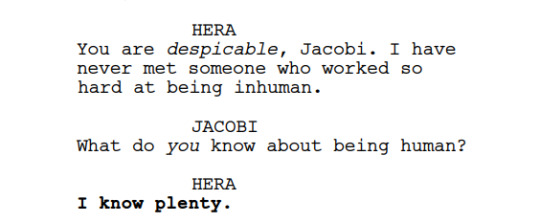
(Ep. 49: HERA: You are despicable, Jacobi. I have never met someone who worked so hard at being inhuman. / JACOBI: What do you know about being human? / HERA: I know plenty.)
This line, from Quiet, Please, where Minkowski defends Hera’s autonomy directly and refers to her as a woman, which I promise will be relevant:

(Ep. 58: Minkowski SLOWLY, maintaining her VICE-LIKE GRIP, PULLS HIS EAR DOWN, bringing Jacobi's face down to her eye-level. / MINKOWSKI (low, deadly): Shut. The Hell. Up. That woman? For the last two weeks, she was the only person who even tried to resist what Pryce and Cutter were doing to us. So you are going to show her some goddammed respect, am I clear?)
And because I’m incapable of writing lengthy meta about Hera without bringing up this quote from Sarah Shachat in some capacity:
“What I can tell you is that the fact Hera that clearly has a human gender in her speech and conscious perspective, yet lacks human physicality, is something she definitely does think about. She isn’t removed from it, or taking the view of some sort of Hyper Advanced Future Machine for whom human binary constructions are funny, if a bit quaint. She’s been placed on a spectrum the same way she was placed aboard the Hephaestus. Her journey so far has very much been about dealing with that, about trying to assert her unique sense of self given the limitations placed on her and to communicate with these other idiots who don’t share her experience.”
While this is about Hera’s relationship to her gender in particular, I think the fact that she sees herself as a woman specifically is relevant. The fact that she has a human gender and she cares about that, and that human concepts of identity in general do apply to her. She doesn’t consider herself separate from or above them.
And that leads, perhaps, to one more question. Is it possible that Hera sees herself as human not because of an innate desire for the attributes of humanity, but because all of the people she knows are human - because once you conflate personhood and humanity on a societal level, is it possible she feels that she will only be seen as a complete person if she is also human? And, I mean… Maybe? It’s possible. But I don’t think it changes the outcome.
I’m asking this here because I think this is also analogous to a trans experience. If you have social expectations of what a woman is, and you feel that you are a woman, and so you choose to conform to those social expectations (to whatever degree) because it allows your womanhood to be recognized… as long as the desire for those attributes comes from a genuine place, can you really tell if you would feel differently about it if society viewed womanhood differently? At some point socialization, societal expectation, and personal preference do get muddled up to a certain degree, and while it’s worth examining to make sure you’re doing what makes you most comfortable, whatever that may be… I think at a certain point ‘I feel better presenting this way than not’ is the only real answer you can find.
I think this also applies to Hera, in her connection to humanity and her expressions of/desires for a kind of physicality. We have a sense of how she canonically perceives herself, and how she struggles to be perceived by others, and with that in mind it’s largely irrelevant to me how she might feel about her identity with social pressures removed. Identity is shaped by connection, and while I waver on how much I want to say that Hera is human, full stop, no qualifiers… She is a person with human desires who wants to be close with and share experiences with her human friends. She is an AI, and that informs her identity and the way she navigates the world, but I don’t believe those things are mutually exclusive.
(I’ve written a little more about why I think Hera’s character arc reads as a trans narrative here.)
More than anything, I have a hard time believing that Hera would want to be seen as fundamentally different from the people she loves, when struggling to overcome that difference both within her own self-perception and in her interactions with others, is such a significant part of her character development. There are times where Hera being an AI does mean she has to consider things that the others might not, and it’s important that the people in her life are aware of and respectful of that. But to emphasize her differences in circumstances where it’s not relevant only serves to other her.
Or, let me put it this way. Whether or not Hera would want a body, if she could have one, is a whole other set of questions, but if Wolf 359 is a show about humanity, about connection, about the value of small, personal things over the Big Picture, then I think if Hera was able to hug her friends, if she was able to go somewhere by herself, entirely by herself, and put her hands in the water, and feel it… even the fact alone that she might have the desire for those things… Well, maybe there’s a way that Wolf 359 is about that, too.
xii. ‘if this is it? i’d rather go as me, thank you very much.’: conclusions
I often see people say that we have ‘no way of knowing’ how Hera might want to be seen, or even that she definitely wouldn’t want to be seen as human, or that it wouldn’t occur to her to want [whatever thing] because she’s ‘not human’ and I just… I don't think any of those things are true. I think there’s plenty to go off of in canon, and I think it all points more in this particular direction than not.
I once saw someone say - as a criticism - that Hera was less of an AI character and more of just “a person in the walls” and that stuck with me because… well, because it was such a funny way of phrasing it, but also because. That’s not a weakness of the writing or a failure of imagination. That’s the point of her character! There are so many other sci-fi stories that are interested in more speculative questions re: how AI characters might be different from us and prioritize different things. That’s not Wolf 359! Hera is not meaningfully different from the others, she just thinks she must be because she has different life circumstances and has been treated differently.
And I understand why people are wary about ascribing ‘human’ qualities to AI characters, given the track record of a lot of science fiction, and the reasons a lot of people might relate to AI characters in particular. I really do. I just believe that in this particular case, with this particular character, and the themes in this particular show, it would be doing Hera a disservice to ignore these aspects of her self-identity that she so clearly canonically struggles to come to terms with, when her physicality in the finale in particular is so much a culmination of this fight to be seen - in both a literal and metaphorical sense.
I believe the tragedy of Hera as a character is that she is written to be fundamentally human, with physical desires, physical loneliness, an internal self-image that - except under extreme circumstances - she can never show to anyone else. But one that matters to her, and that she holds onto, nonetheless.
And there’s so much more I could say. I could talk more about Hera’s connection to water, her apparent draw to the natural and tangible. I could talk about how she reads, the way she processes things through emotion and into memory. I could talk about how she phrases things in terms like “now I’m going to have a headache” and only rephrases if someone challenges her on her wording. I could talk about how, while, yes, she is technically always everywhere, it’s also established that she can be more present in one place if she wants to be (and how this connects to her learning mindfulness in canon.) I could talk about how Hera sleeps, how she dreams, how Pryce has intentionally given her nightmares and threatens her with more.
But all of those are just details. If there’s anything I’d want people to take away from this, it would be that, one, over the course of the show, I believe it becomes more and more apparent that Hera is fundamentally just an average, more-or-less human person navigating extremely abnormal and inhumane circumstances, and, two, she experiences physical loneliness. She starts off the show embittered by, and in part in denial of, these facts, and by the ways she’s been mistreated, isolated, and othered. Accepting that she’s not fundamentally different from the people around her, and therefore not intrinsically doomed, is what ultimately allows her to leave the Hephaestus with the others, and allows her to believe that building a life on Earth is possible for her.
#wolf 359#w359#hera wolf 359#hera w359#okay. it's done. it's done.#it's impossible for this to ever be as thorough and clear as i want it to be. but it's done.#thank you so much to beth for helping my organize my thoughts#it's just like. i don't know.#so many people seem to read the way hera sometimes distances herself from humanity#as a desire to be seen (and respected) as something different#but it's always in moments of loneliness and hurt. to me it reads like an expression of pain#like distancing herself before anyone else can other her#but that's just one part of it too. i can't separate my feelings about hera and humanity from my feelings about hera being trans.#anyway. honestly i'm really nervous about posting this because it's a topic that's so close to my heart#but i hope other people understand what i'm saying and find it resonates with them
250 notes
·
View notes
Text
.
#one time my mom told me that she hoped that judas iscariot did repent before he died. she has this deep deep desire#that everyone who thinks they're beyond hope can understand and reach for God's love and mercy before it's too late#which some people could probably interpret as wishful thinking#re: judas and what is traditionally believed of him. as well as the people who reject the Gospel very energetically#but after seeing her grandfather and father (adamant atheists who ridiculed her for her faith) believe in and accept Jesus as their#saviour right before both of them passed away i think she has so much love for people who think they're beyond forgiveness#anyway she mentioned it once and she nearly cried because the idea of someone being in that much despair and guilt hurt her a lot#she's a teacher who's currently dealing with the fallout of a recent suicide that's been affecting her students#and a mother and aunt. and someone who was and is mentoring broken-hearted kids who can't see light in their life#she imagined what kind of welcome judas might have in heaven if he repented before he died and what kind#anyway i don't know what the point of this post was but i still think of this
27 notes
·
View notes
Text
I finally got my friend (the same one who desperately needs to know if Chonny uses organic hair products, for whatever reason) to actually listen to a bit of his music and she actually kind of liked it.
#That makes two people I’ve at least partially converted into being Jashers /j#Next is cccc lore /j#S.K’s personal anecdotes that he doesn’t feel great about posting despite his “break” but will post anyway because he thinks they’re funny#S.K thinks#Chonny Jash#this same girl told me (in response to me asking why she needs to know if Chonny uses Organic hair products):#“My heart desires to know”#Keep in mind I haven’t told her anything about CCCC yet.#So I very audibly go “your WHAT” and then fell out of my chair
11 notes
·
View notes
Text
#DARK VC //WHO DO YOU THINK I AM!!!!!!!!!// <- guy who would absolutely loathe. from the bottom of his heart. taking care of a baby#but would do it anyways bc his pride just got hiT @dnangelic HELPPPPAHDKWBCJABD

... she's not too fond of being taken care of for such a shallow reason.
#dnangelic#&&. babykuno#H.AKUNO TRAIT OF DESIRING ONLY HASHTAG REAL AND TRUE FEELINGS !!!!!#if ur heart's not actually in it then WHAT'S THE POINT!!! 😤😤#I LOST MY FACKING MINDD READING UR TAGS THO TSUNO WUNO WVXJWHFKWHCKWHC#@ DARK WHY ARE YOU BOOING HER SHES RIGHT ??!?!?!#also pls the way u made me use the cursed babykuno icon 😭😭😭#it's some kinda achievement frfr this is the first time i've used this icon SCJFWJKFNS
9 notes
·
View notes
Text
they really do just dangle the concept of a pandora hearts anime reboot being an actual thing over our heads like we are rats in a maze with unobtainable cheese around the corner. like. is the 2% sanity i have left a joke to u. this is so sick. i feel like shit i just want to look forward to seeing my son on a regular basis again
#mine#pandora hearts#i am not sorry i am so not normal rn bc the daily oz acc just posted a translation for one of the 15th anni things ive never seen translate#& i am. massively unhinged.#the fact that they made such a blatant allegory to a reboot#but also specifically the way that was not just like. ooo a message from oz teehee#THEY LITERALLY GOT JUNKO MINAGAWA HERSELF TO REPRISE HER ROLE AS OZ TO VOICE IT#sick and twisted to rattle me in a blender like that.#AND THEN THE NENDROID ANNOUNCEMENT THIS YEAR TOO#i cant do this ive literally spent half my life waiting for justice to be served for my son im unhinged. im twisted. im craazzyyy#ill literally never have depression again if ph gets reboot like ill just be the worst person on earth on purpose#i will literally not shut up for a singular second. i will take screenshots of oz every second he is on screen#and post all of them. i will be the worst most obnoxious annoying person ever#AND U KNOW WHAT#ID DESERVE IT SO LET ME HAVE IT GIVE HIM BACK GIVE HIM BACK GIVE HIM BACK GIVE HIM BACK#they literally know. how desired it is. like ffs fiction junction STILL performs the op & ppl go wild for it every time still.#junko minagawa reprised her role as oz just for that little treat#mochijun and yuki kaijura are still friends.#everything is there why arent u budging why are u keeping him trapped behind a door#stop gatekeeping my son and return him to me ive been waiting for him to come back home for 8 years#i cant do it anymore#i deserve to live my best life in a quaint studio apartment w my daughter & i watching ph's reboot together.#hand it all over i am tired of being nice i dont even Want to go apeshit i AM apeshit
10 notes
·
View notes